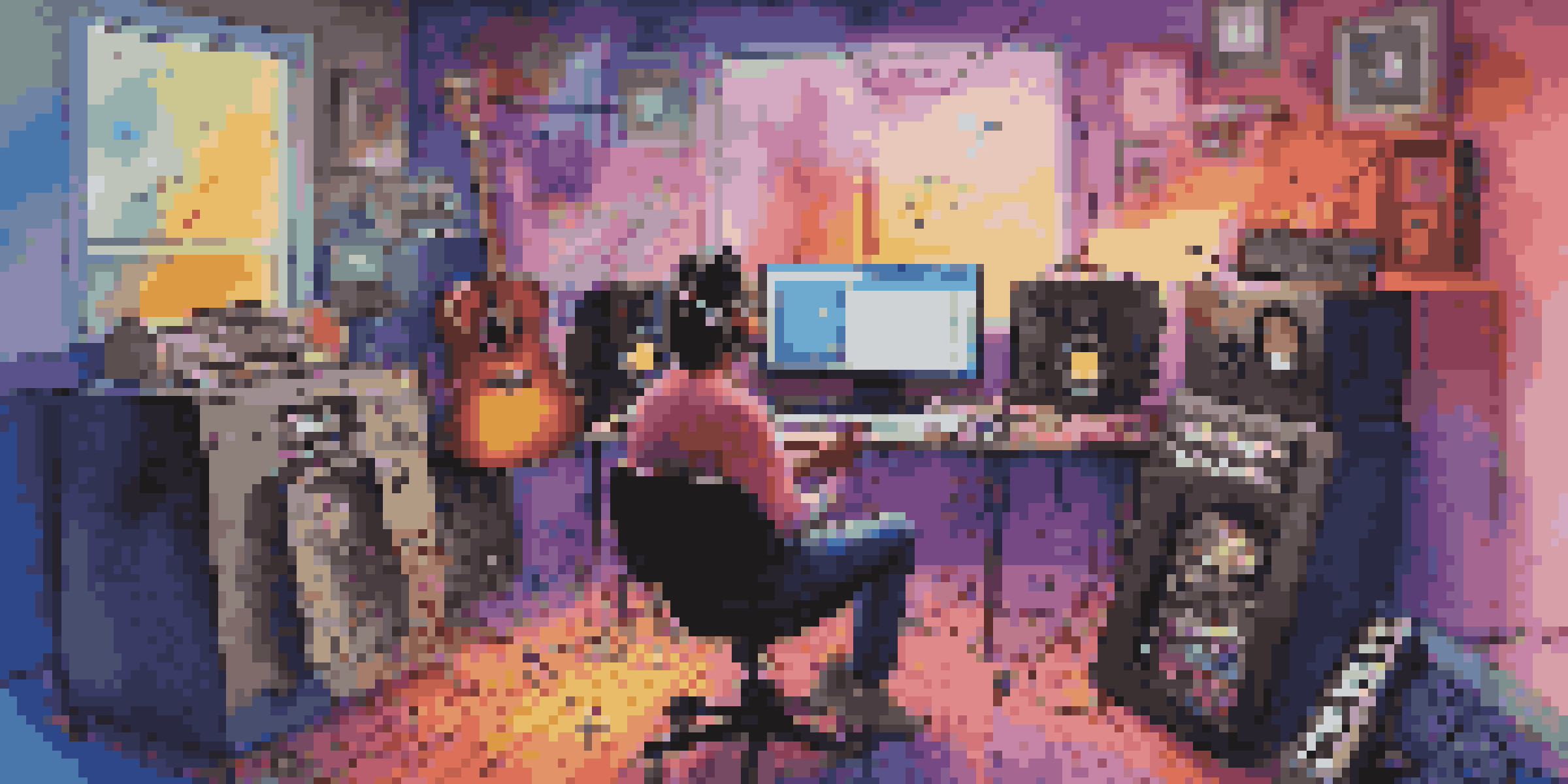Market Trends: The Growth of Music NFT Platforms

Understanding NFTs and Their Role in Music
Non-fungible tokens, or NFTs, are unique digital assets verified using blockchain technology. In the music industry, they offer artists a revolutionary way to sell their work directly to fans, eliminating traditional intermediaries. This direct connection not only empowers artists but also provides fans with a sense of ownership and investment in their favorite music.
The future of music is not just about the music itself, but about the experiences we create around it.
For example, an artist can create an NFT of a new song and sell it exclusively to a limited number of fans. This not only enhances the value of the music but also fosters a community around the artist's work. As a result, NFTs are reshaping how we think about music ownership and distribution.
Moreover, the growing interest in NFTs has prompted many musicians to experiment with this technology, exploring innovative ways to monetize their art. With platforms dedicated to music NFTs, the landscape is rapidly evolving, making it an exciting time for both artists and fans.
The Surge of Music NFT Platforms
In recent years, music NFT platforms have seen remarkable growth, attracting both emerging and established artists. These platforms, like Audius and Catalog, provide a space where musicians can tokenize their work, creating a new revenue stream that was previously unavailable. This shift has caught the attention of many in the industry, sparking a wave of interest in digital collectibles.

As the popularity of NFTs grows, so does the competition among platforms. Each one is vying to offer unique features, such as enhanced fan engagement or exclusive content. This competitive landscape is driving innovation and pushing the boundaries of what is possible in the music industry.
NFTs Empower Artists and Fans
NFTs allow artists to sell their music directly to fans, fostering a sense of ownership and community.
Furthermore, the accessibility of these platforms allows artists from various backgrounds to participate, democratizing the music industry in a way that was not possible before. Independent musicians can now reach global audiences and build their brands without the need for a major label.
Consumer Interest in Music NFTs
Fan engagement is at the heart of the music NFT boom. Consumers are increasingly drawn to the idea of owning a piece of their favorite artist's work, whether it be a limited-edition track or exclusive merchandise. This desire for unique experiences has led to a burgeoning market where fans are willing to invest in digital assets that hold personal significance.
Music is the shorthand of emotion, and NFTs are the new canvas for artists to express that emotion uniquely.
For instance, a fan might purchase a rare NFT representing a live performance, granting them access to exclusive content or VIP experiences. This not only strengthens the bond between artist and fan but also cultivates a community of passionate supporters. As fans seek more meaningful interactions with artists, the appeal of music NFTs continues to grow.
Moreover, the excitement surrounding NFTs has generated conversations around music ownership and copyright. As fans invest in these digital assets, they are also becoming more aware of the rights and responsibilities that come with owning music in this new format.
Challenges Facing Music NFT Platforms
Despite the exciting prospects of music NFTs, there are significant challenges that platforms must navigate. Issues such as copyright infringement and the environmental impact of blockchain technology are at the forefront of discussions. These concerns can create hesitance among artists and fans alike, potentially hindering the growth of this innovative market.
Additionally, the technical barriers associated with NFTs can be daunting for those unfamiliar with cryptocurrency and blockchain. Many artists may find it difficult to understand how to create and sell NFTs, which could limit their participation. Simplifying the process and providing education will be essential for wider adoption.
Growth of Music NFT Platforms
Emerging platforms like Audius are democratizing music distribution, providing new revenue streams for artists.
Lastly, the market's volatility presents another challenge. While some NFTs have sold for staggering amounts, others have failed to gain traction, leaving artists and investors in precarious positions. Navigating this unpredictable landscape requires careful consideration and strategy.
The Role of Major Labels in Music NFTs
As music NFTs gain traction, major labels are beginning to take notice, exploring how they can integrate this technology into their business models. Some labels have started to invest in NFT platforms or collaborate with artists to create exclusive digital releases. This involvement could significantly expand the reach of music NFTs and validate their place in the industry.
However, the entry of major labels also raises questions about the balance of power in the music industry. While labels can provide resources and marketing expertise, their involvement may shift the focus away from independent artists who have been leading the charge in the NFT space. Finding a way to coexist and support all musicians is crucial for the future of music NFTs.
Moreover, as major labels adapt to this new landscape, they will need to address the evolving expectations of consumers. Fans are increasingly looking for authentic connections with artists, and labels must find ways to facilitate this while still protecting their interests.
Future Predictions for Music NFT Platforms
Looking ahead, the future of music NFT platforms appears promising, with continued growth expected in the coming years. As technology advances and more artists engage with NFTs, we might see new business models emerge that redefine the traditional music industry landscape. This evolution could lead to a more equitable distribution of revenue for artists and a richer experience for fans.
For instance, we may witness the rise of dynamic NFTs that change based on fan interactions or milestones in an artist's career. This could create a more immersive experience, allowing fans to feel even more connected to the music they love. The potential for innovation is vast, and the possibilities are only limited by our imagination.
Challenges in the NFT Landscape
Despite their potential, music NFTs face issues like copyright concerns and market volatility that need addressing.
As the music NFT market matures, regulatory frameworks will likely develop to address copyright and ownership concerns. This could provide greater security for artists and fans alike, fostering an environment where creativity can flourish without fear of infringement.
Conclusion: Embracing the Music NFT Revolution
The growth of music NFT platforms marks a significant shift in how artists connect with fans and monetize their work. By embracing this technology, musicians are not only taking control of their careers but also creating new opportunities for engagement and community building. The potential of NFTs to transform the music industry is immense, and we are just beginning to scratch the surface.
As both artists and fans explore the possibilities of music NFTs, it’s essential to approach this new landscape with curiosity and caution. While there are challenges to overcome, the benefits of direct artist-fan relationships and unique ownership experiences are worth pursuing. Together, we can shape the future of music in a way that honors creativity and innovation.

In conclusion, the rise of music NFT platforms represents a thrilling chapter in the evolution of the music industry. As we witness this transformation, it’s an exciting time to be both an artist and a fan, ready to embrace the new possibilities that lie ahead.